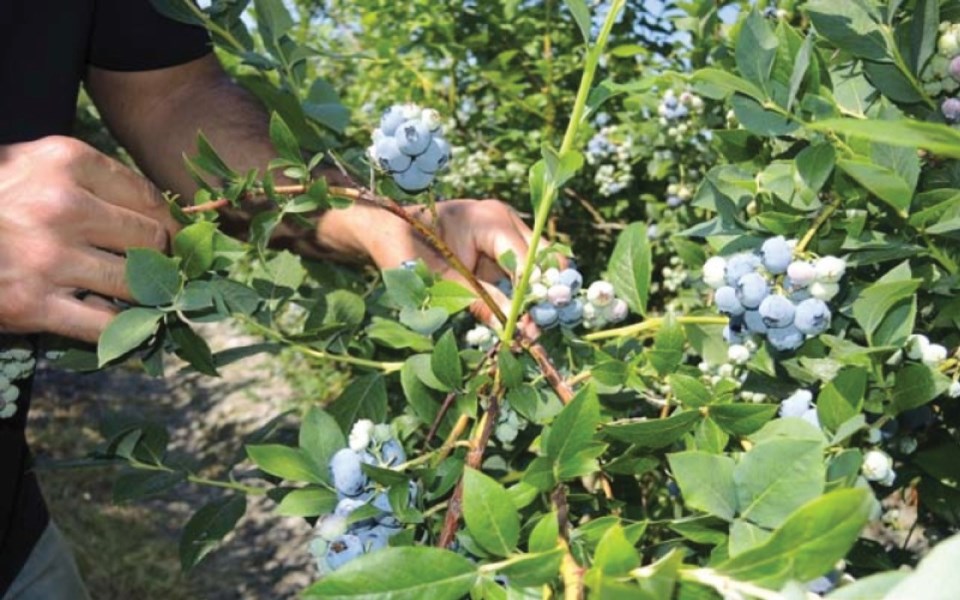As much of the province grapples with working from home during the pandemic, B.C.'s farming industry is facing the monumental task of bringing in around 10,000 seasonal workers from overseas.
Negotiating isolation protocols with the government, making sure workers have visas and scrambling to find rare flights to even get them here are just some of the hurdles facing the industry right now.
The federal government has made an exemption for temporary foreign workers – and those within the farming industry's Seasonal Agricultural Workers Program (SAWP) – to be allowed into Canada during the COVID-19 crisis.
But with the pandemic closing visa offices in Mexico – where the vast majority of the seasonal workforce comes from – there are doubts whether the B.C. farming sector will get enough labour in time to harvest its usual bountiful crop come the summer.
Rhonda Driediger, vice-president of the BC Agriculture Council (BCAC), said the colder than usual spring is throwing the industry a lifeline at the moment, potentially delaying the ripening of the crop.
However, Driediger said a lot will depend how soon the visa offices open in Mexico and how long the travel restrictions will last internally in Canada.
And she envisages the brunt of impact being felt in the Okanagan, where they rely on hand-harvesting of their prize cherry and apple crops.
"We will get a workforce, we just don't know how many at the moment," said Driediger who, as well as heading up the council's labour committee, runs her own 160-acre berry farm in Langley.
"I think we're going to see a lot of workers coming later than usual. If no commercial flights are available, we may have to consider organizing charter flights for the workers. We have to. We have to get them here.
"Most of the blueberry and raspberries are machine-harvested. The hand-harvesting of fresh berries in the (Fraser) Valley is done by a domestic workforce. Most of the temporary workforce (from overseas) is for mechanical harvesting.
"I see the biggest problem being in the Okanagan, where there is a lot more hand-harvesting for the likes of cherries and apples.
"They don't have a big domestic workforce to rely on, given where they are, and they reply a lot on Quebec students coming out here in the summer to do piece work."
If that group from Quebec isn't able to travel due to pandemic restrictions, Driediger said that "could be a big problem."
"If we're still in this (current holding pattern) in, say June, who knows whether we'll even get our domestic workforce, let alone seasonal workers from abroad," she said, pointing towards local workers who might not be able to come to work due to the virus.
"It could reduce the amount of berries we can pick and freeze. The crop doesn't wait for us."
Approximately 7,000 seasonal workers come in from Mexico via SAWP every year, plus another 1,200 to 1,700 from the Caribbean.
A program called AgStream brings in workers from regions outside of Mexico and the Caribbean.
"This is a massive undertaking for agricultural organizations across Canada," said Driediger, who hopes to have a 30-strong temporary foreign workforce at her farm this season, 12 of whom are already here.
"The industry has been working non-stop since it got the opening for seasonal workers to be exempted. Getting them onto airplanes here is quite another matter."
Veteran Richmond farmer Bill Zylmans, who is also chair of the Canadian Potato Council, has never seen anything like this in the 50 years his family has owned and operated more than 500 acres on Westminster Highway near No. 8 Road.
And although he doesn't hire any seasonal foreign workers, he admits he's having many sleepless nights – much like everyone else - about his forthcoming, signature strawberry crop.
"All of the food sector is scrambling to get our product on the shelves right now," said Zylmans, who said his roadside stand for potatoes is booming right now.
"(Seasonal foreign workers) is one area I thankfully don't touch, I have a great local labour workforce. But there is lots of uncertainty, even with that.
"My needs don't start until nearer the strawberry season in June and I've always been able to get local workers. But what's (the pandemic) going to look like by then?
"My strawberry industry is a huge part of my operation. Am I going to have to take drastic action? Who knows?
"We are so highly dependent on labour, it's very worrying for the industry.
"This is unprecedented territory; we're in times worse than the WW2. The only difference is we're not getting the bombs from above."
Survival in a crisis, added Zylmans, is "all about food" and that's something he thinks the politicians are starting to talk more about.
"It's all about food supply now. Food is life."
This article originally appeared here.




